Here is an interview with mouse on the keys about their 2012 EP machinic phylum.
I should mention that Kiyota Atsushi left the band in May 2021, and he was subsequently replaced by Shiroeda Takumi. Furthermore, it appears that mouse have fully resumed their activities since late 2022—they just played a show in December. It’s good to have them back.
Interview & text: Kato Shota (Japanese text)
Photography: Nagamine Takuya
English translation: Henkka
mouse on the keys: Linktree
Note: You can buy machinic phylum on CDJapan.
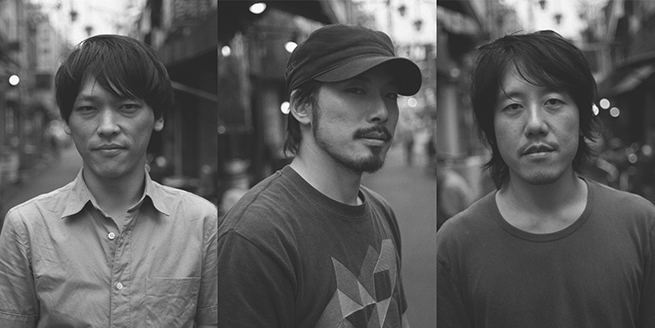
Following the release of their first full-length album, an anxious object, mouse on the keys have been dedicating themselves to building up the band through performances both in and outside the country. The band’s transformation towards an increased sense of energy and more improvisation could also be seen on their recent video production, irreversible, which captured their European tour.
Breaking their long silence, mouse on the keys have just released machinic phylum, their first solo release in three years. On its four songs the band offer not only the condensation of the elements described above, but they also demonstrate the new direction of where it is they are headed next.
Now, 10 months since the release of irreversible, where have mouse on the keys set their sights going forward? On one early afternoon in Nishiogikubo, we sat down with members of the band to exchange some words.
— machinic phylum is your first actual solo release in three years, but release-wise you also put out your DVD, irreversible, and streamed your charity songs with aku.
Kawasaki Akira: Right. We’ve been keeping busy doing all sorts of things. Music for TV commercials, too.
— Having witnessed the aggressive transformation of your live shows, rather than you incidentally “ending up” with a three-year blank between releases it feels to me more like you chose to have this three-year blank. Would you say this was the case?
Kawasaki: The truth is that it just happened. Rather than it taking us a long time to write the songs and such, we spent more time on just thinking about where we were going to go from here. As a band, we’d been on tour in Europe, we’d performed with lots of people including Aku, and we’d just become very aggressive. We wondered about how we would incorporate all that in our next release. In the past three years even my own perception of music has changed.
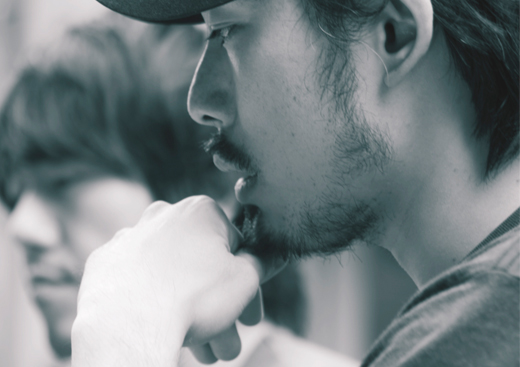
— Could you elaborate on that?
Kawasaki: Whereas in the past I was more oriented towards simply recreating things we’d already polished to perfection beforehand, now I’ve become interested in introducing that “live energy” and unpredictability into our sound. But I was having trouble picturing how I could actually convey that in our next recorded work. In simple terms, I wanted to make something not using overdubs, but rather something done in one take.
When we actually tried that approach with this release though, we found that we weren’t able to pull it off yet. We kept jamming on the songs while writing them, but then putting it all together took time… Ultimately, we just didn’t have enough time to practice and do the finished songs in one take. We were pretty much working on this release until the last minute.
Kiyota Atsushi: Despite the three-year gap it really was last-minute. (laughs strainedly) But we did achieve good results so I’m glad about that.
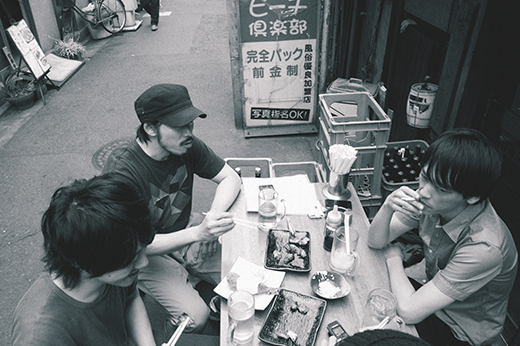
— To me, it feels like machinic phylum could be split into two halves: the first and second songs, and the third and fourth songs.
Kawasaki: That’s ultimately how it turned out, yeah.
Niitome Daisuke: We already had “plateau” around a year ago.
Kawasaki: Right. The second track, “plateau,” is an extension of a song we did for a commercial for the canned coffee brand ROOTS. The other songs all came after that one. We wanted to make this EP into like a box lunch containing all the tasty parts of mouse on the keys. Like, just songs embodying our aggressive style, with lots of precision and all those sixteenth notes—things that make us mouse on the keys. But then we thought, hey, wait a second… Maybe we could go for the opposite and have a more relaxed song in there, too. That became the third track, “clinamen.”
— Especially the first track, “aom,” feels like a condensation of all your energy and unpredictability.
Kawasaki: “aom” is an abbreviation of “agglomeration of mouse (on the keys),” so it basically means like, “the soul of mouse.” We made the composition itself through a process of cutting and pasting parts of jam sessions by the three of us, taking the resulting musical phrases and practicing those, and then performing them. This is a first in mouse on the keys’ history in that it’s a co-composition by all three of us, so we titled the song that to signify it being an aggregation of musical phrases by all three of us.
— I see. On the other hand, the fourth song, “memory,” is the one simple, straightforward track here.
Niitome: “memory” is a collaborative song, and it was another one of its composers, Levon Vincent, who gave it the title. Levon sent us some audio, but rather than an actual “song” it was more like a repetition of several different patterns played with one synth tone. He himself calls it a song, but we arranged it.
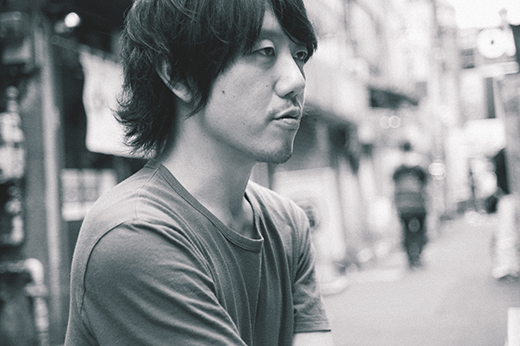
— Who is this Levon Vincent person?
Kawasaki: He’s an American underground house DJ and producer. He just recently released a Fabric remix CD.
Niitome: Levon also runs his own label. He’s an American, but he lives in Berlin. We’d been talking about doing a release together, but we could never seem to get the timing right until we finally got to work on it for this EP.
— How did you first link up with him?
Niitome: Levon came to DJ in Japan, and Kou (Note: mouse on the keys’ stage producer) was looking after him during his visit.
Kawasaki: Kou is who made the 3D screen we used at our show at the Kanazawa 21st Century Museum of Contemporary Art. His main gig is stage management for festivals and fashion shows and that kind of thing, but he also helps out with our live shows. On the side he also attends to overseas club artists, and that’s how he introduced Levon to our music.
Niitome: Levon Vincent apparently liked our stuff when he heard it. He commented on our Facebook fan page about how we should “do something together,” and so we began communicating directly via e-mail.
— “memory” very clearly sounds like a kind of song mouse has never done before.
Kawasaki: What’d you think when you heard it?
— What with it being such a soft song, it was the one track that left the biggest impression on me. This is something I just wanted to check with you, but to me it feels like this is you not only broadening the scope of the kinds of songs you’re doing, but it might also be a reflection of the general direction you’re going to be taking from here on out…
Kawasaki: Well, the first two songs are sort of these crushing, aggressive tunes characteristic of mouse on the keys. But now as these fortysomething guys whose bodies can hardly keep up anymore, with the last two songs we kind of just wanted to heal. That’s my take on it anyway.
— (laughs)
Kawasaki: “memory” was all Tome. So really it’s a collaboration between Vincent and him. Maybe there were a couple of spots during recording when me and Kiyo arranged it a little by saying, “Should we expand on this part a bit?” But fundamentally the composer is Niitome Daisuke.
Niitome: I made it partly based on my own personal taste, and partly on what I felt mouse would sound like if we were doing something kind of ambient.
Kawasaki: “memory” represents one aspect of mouse on the keys’ future direction.
— I see. A minute ago you said something about how you wanted to “heal.” Could you elaborate?
Kawasaki: In terms of melodies, I guess I mean like wanting to write songs that are gentle and relaxed—where you listen to them and you feel like you’re floating. Speaking in terms of our acoustics, if mouse on the keys were to play live somewhere like the Hibiya Open-Air Concert Hall for example, I feel like we might not be able to make best use of that airspace with just the songs we’ve done until now. Sure, there’s this kind of a tight density to our sound, but we don’t have many songs that just sort of… permeate the air. I want us to scale up in that sense. Sounds that stretch out for longer, slower BPM’s, easier-to-hear phrases… I bet it’d feel even better for us to play live if we had more songs like that.
I did have a desire to do something along those lines even before these recordings, but I didn’t know how to give form to that desire. In that sense, though, I think Tome managed to something a bit like that with “memory.” We’re now in our sixth year, and I feel like while tracks one and two represent the sort of beauty mouse on the keys has managed to amass in our first five years, the fourth track “memory” hints at our future direction.
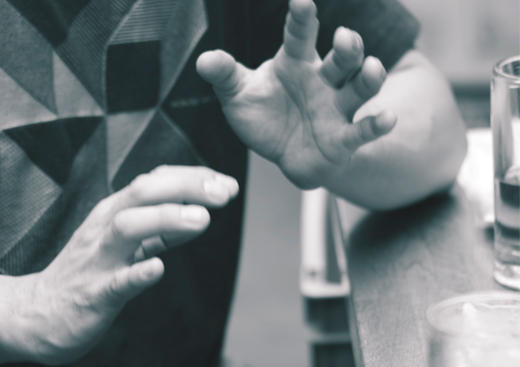
Niitome: If we’re to be playing live sets that are a bit longer, it’d be good if we could give the crowds a wider range of different sounds. That’s one consideration I had in mind with that song.
— You each have your respective intentions, and yet it seems like they’re all pointing towards the increase of more ambient songs.
Kawasaki: Aside from irreversible, this EP is our first actual release in three years. I believe that our next release—be it a full-length or whatever else—will show even further development. I don’t want our next album to be just us deciding everything beforehand and reproducing that, but a mix of even more live-sounding elements, more soft parts, and a more ambient feeling. That’s how I feel right now anyway.
Kiyota: Although, I don’t think it’s like that’s all we’re going to be about either. I feel like it’s more about adding depth.
Kawasaki: Right. There’s still going to be the kind of aggressive stuff like before, but I think there’s also going to be more large-scale stuff; stuff that’s more relaxed. That’s the way the piano is supposed to be by its nature, right? Up until now, mouse on the keys hasn’t really been like that—we’ve been more technical, not exactly “piano for people who dig the piano.” And we always knew that. But I think going forward it’d be good if we could put out more of that “pleasant piano feel” in our stuff, too.
Kiyota: That’s probably also true for the drums, too. Whereas before it’s like you were smashing away at them, now there’s more of that calmer stuff, too.
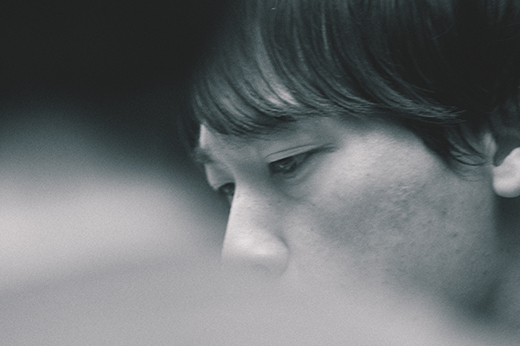
Niitome: Kawasaki’s drumming itself is changing. I feel like it’s more free, and the bits that used to be stiff before sound rounder now, in a good sense of the word.
— So it’s sort of like you’ve mellowed out.
Kawasaki: I guess breaking my capillary vessels made me soft. (laughs) (Note: Please refer to the previous interview.)
Kiyota: (laughs) I do think it’s something you’re conscious of though.
Kawasaki: I now see the decline in my stamina not as a loss but as growth. It’s like, after three European tours we’d acquired that vigor of a live band, but then what awaited us beyond that was a softer realm. Like, whether it’s diving into the crowd and screaming your guts out into the microphone versus just playing softly, they both take the same amount of energy and resolve. Anyway, I want to be forthright in this pursuit of a more ambient direction.
— mouse’s previous works had included guest performances by Nemoto Jun (sax, Z/hununhum) and Sasaki Daisuke (trumpet), but machinic phylum features only the three of you. How come the other two weren’t featured this time around?
Kawasaki: Just to keep open the future possibility of playing live only by the three of us. It was just us three when we played at LITE’s SuperDeluxe event the other day.
— It feels like that’s something that might affect your setlists, too.
Kawasaki: A little bit, yeah. At SuperDeluxe, we didn’t play “toccatina” or other songs where the wind instruments are in the forefront, instead focusing on songs we could do by the three of us. Despite us being a three-piece band we have a pretty established image of also featuring wind instruments, and although we gained a lot of good from playing live like that until now, there’s also a kind of beauty when we can do something by just us three. We’d been talking from before about how that was something we wanted to do.
Our intention with machinic phylum from the beginning was to make it just by the three of us, so that was good, too. It’s kind of an extension of that—trying to play live more on our own, I mean.
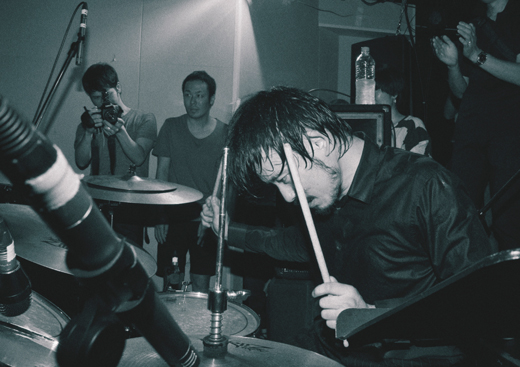
— I see. So there’s going to be more variation not only in your songs, but in your live performances, too.
Kawasaki: Of course, we’re still going to play shows with Jun and Sasaki, too.
— This is related to how you were just talking about the “pleasantness” of the piano, but I’d personally love to see you play live using real pianos.
Kawasaki: That’s actually also something we’re thinking of doing.
— Ooh, really?
Kawasaki: We did these spot adverts for machinic phylum (directed by Ota Yoshiharu) with two grand pianos and a drum set. Jun and a bunch of people were there to watch, and the response we got was surprisingly positive. Seeing how we managed to do that for those promotional videos, the idea of doing it for real started to seem more doable. We felt like we could maybe bring out the colors of us three more, and that a more “majestic” image would help produce an atmosphere better suited for more ambient music. Also, grand pianos just have a feel about them live that you can’t achieve with digital pianos.
Kiyota: I feel like if we were to use grand pianos it would change not only our performances but the songs themselves.
Kawasaki: It’d change my drumming, too.
Kiyota: With our songs up until now, I was always playing them on the digital piano almost as if it was programmed sounds. But with a live piano, it’s like the sound can reach somewhere even better… It changes my playing and my timing. So in that sense it’s something I’m quite looking forward to doing.
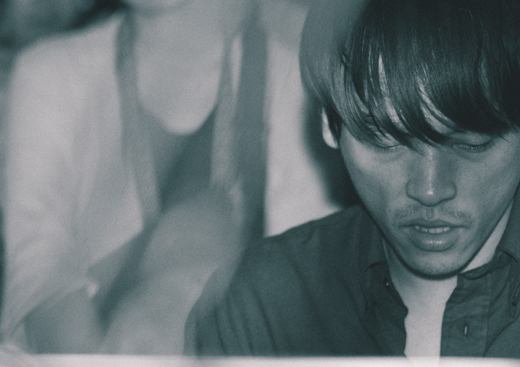
Niitome: More simply, it just feels better. During breaks in the filming we were playing the songs we always play by the three of us, and it was so much fun.
— So as the instrumentation changes, so do the song arrangements.
Kawasaki: Right. Although we do use grand pianos during recording. But there we employ overdubs and present it in a way where the sound is in proper balance—when you’re actually playing live you’re forced to alter the arrangements due to things like it being physically too quiet or loud otherwise. But also, even if we do play live using grand pianos, we’re still going to be also using samplers and synths and such like always.
— With that in mind, I would think playing with the Suga Dairo Trio back in May must’ve been quite a stimulating experience for you.
Kiyota: Yes. That was a very eye-opening experience.
Kawasaki: Playing with Suga Dairo, it made mouse on the keys’ direction even clearer—how we should be mixing electric and acoustic, having more ambient elements, and embodying ideas oriented towards club music. After all, in terms of pure jazz trio methods we’re obviously no match to someone like the Suga Dairo Trio.
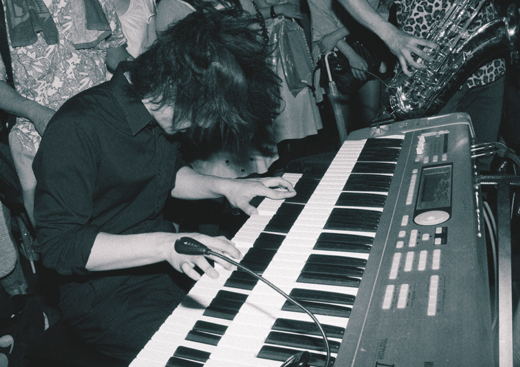
— Conversely, I would think most people tend to categorize your music as “jazz.” What’s your take on that?
Niitome: We don’t limit ourselves to only jazz. We neither confirm nor deny.
Kiyota: I don’t think about it in the least.
Kawasaki: Over in Europe we’re often called “nu-jazz.” When we performed at a jazz festival in the Czech Republic, their flyers described us as just that. But compared to your typical so-called “nu-jazz,” the drumming in mouse on the keys is a lot more rock. So that would probably make us a new breed of nu-jazz. As long as it gets lots of people listening to us, I don’t mind people calling us post-rock or nu-jazz or whatever.
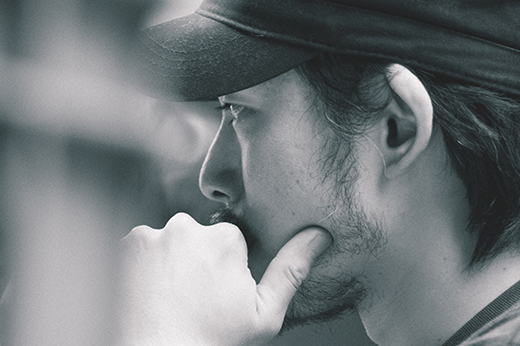
Niitome: In Europe, we’ll get grandpas with gray hair coming to our shows, or people around our age bringing their dads along with them. In Japan, jazz is more difficult to approach—it kind of has this “posh” image. But when we played this jazz club in Germany, the staff there were saying, “Jazz is music that people with no money listen to.” I was surprised to hear them say that. Jazz has a completely different image in Japan, right?
— In Japan it’s seen as like… “Somewhat complicated music for adults trying to act their age.”
Niitome: Right. But they were saying to us, half-jokingly: “Jazz is music for hermits who live alone in the attic, spending what little money they have on wine and records.”
Kawasaki: This one gray-haired grandpa bought one of our records at that same jazz club. I was pretty chuffed about that. That reminds me, a while ago I read this book called Avant-Garde Jazz: Europe Free no Kiseki (authored by Yokoi Kazue). It talks about how Europeans had to try and find their own jazz; their own voice, because they couldn’t compete against Americans—the originators of the genre.
That feeling of needing to do jazz in a certain way as a counter to America applies not only to Europe but to Japan as well. That’s similar to my own approach to doing music, and it feels like it might be the reason mouse on the keys seems to suit Europeans so well. So our thanks to the European soil for accepting us! We’re going to continue absorbing various kinds of things and different music, and strive to create something unique. We would like not only Europeans but for people all over the world to listen to our music!
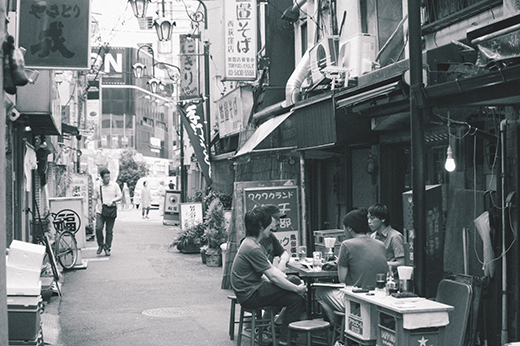
Editor’s Postscript
Two weeks after our interview, I went to see mouse on the keys live. This day’s show looked different in that the instruments had been set on the floor, with the audience surrounding the band as they performed—the so-called “American hardcore” floor show style.
The formation was a bit different, too. Sasaki Daisuke on trumpet was absent, leaving Nemoto Jun on sax as the only supporting member. I’d heard that the setlist would be somewhat different as well, but I wasn’t expecting the actual song arrangements to change, too. They played the third track off machinic phylum, “clinamen.” I was listening, expecting to hear the original version consisting only of drums and two keyboards, when Nemoto’s sax—something not heard in the original song—suddenly cut in. I couldn’t help but get immediately fired-up, surprised that the band would add wind instruments to a song which had originally featured just the three of them.
Going forward, I do think mouse on the keys are going to be showing us more variety in their music and their live performances. How are they going to incorporate an ambient nuance into their lively, improvisational sound, and how will it come to fruition on their next album? I for one can’t help but have high expectations for a band who are so evidently determined and willing to embrace change.
Editor-in-Chief: Kato
